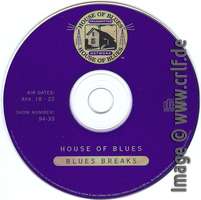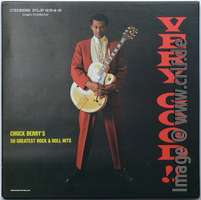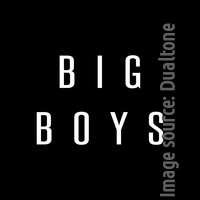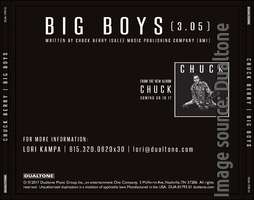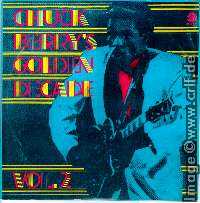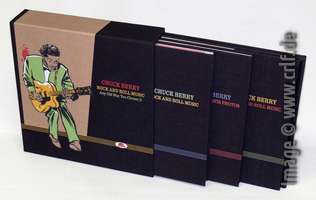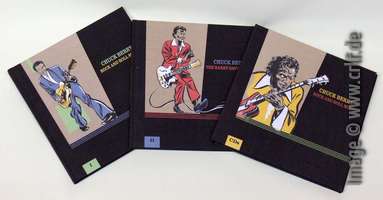Saturday, March 17. 2018
Chuck Berry's Chess Albums - How they could have been
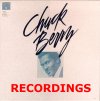
Arian Collins is a Chuck Berry fan like us. He recently wondered about the strange release strategy Chess showed with the first ten years in Berry's carrier. Songs were left on the shelf, placed on albums years after recorded or even released as singles only.
Thus Arian imagined how Berry's early albums would have looked like if Chess did release all recordings in time.
On his blog "Albums Back from the Dead - Recreating albums that never actually existed" Arian shows us Berry's Chess albums he imagined, including track listings which follow the recording dates and imaginary covers.
Look, read and enjoy
Chuck Berry 1955-59: https://albumsbackfromthedead.blogspot.com/2018/02/chuck-berry-discography-1956-59.html
Chuck Berry 1960-66: https://albumsbackfromthedead.blogspot.com/2018/03/chuck-berry-discography-1960-66.html
Thus Arian imagined how Berry's early albums would have looked like if Chess did release all recordings in time.
On his blog "Albums Back from the Dead - Recreating albums that never actually existed" Arian shows us Berry's Chess albums he imagined, including track listings which follow the recording dates and imaginary covers.
Look, read and enjoy
Chuck Berry 1955-59: https://albumsbackfromthedead.blogspot.com/2018/02/chuck-berry-discography-1956-59.html
Chuck Berry 1960-66: https://albumsbackfromthedead.blogspot.com/2018/03/chuck-berry-discography-1960-66.html
Posted by Dietmar Rudolph
in Chuck Berry Recordings
at
17:31
| Comments (0)
| Add Comment
| Contact Webmaster
Monday, February 26. 2018
Where have we heard this interview before?

This site's section on Radio Show and Promotional Records has a description of the most interesting Chuck Berry records which were not available for public sale. This includes the so-called Radio Show albums which are LPs (later CDs) containing pre-produced radio shows to be broadcast by radio stations nation-wide. Some of these albums contain interviews or even music not available anywhere else.
I recently received another of these radio albums containing five segments of 5 to 7 minutes each to be broadcast as House of Blues Breaks on CBS stations. The segment for Thursday, 21 April 1994 concentrates on Louis Jordan but holds an interview segment by Chuck Berry related to Jordan.
Berry says:
This does sound very well-known. We have heard Berry tell this in multiple interviews before. However, I checked the remaining radio station albums and did not find this specific segment. Do you remember where we have heard this specific interview segment before? Let me know.
I recently received another of these radio albums containing five segments of 5 to 7 minutes each to be broadcast as House of Blues Breaks on CBS stations. The segment for Thursday, 21 April 1994 concentrates on Louis Jordan but holds an interview segment by Chuck Berry related to Jordan.
Berry says:
They say that's a Chuck Berry song because it goes 'da-da-bi-da-bi-da-bi-du-a-da-bi-du-a'. Well, the first time I heard that was one of Carl Hogan's riffs in Louis Jordan's band. We have T-Bone Walker - I love T-Bone Walker and his blues. So you put a little Carl Hogan, a little T-Bone Walker, and a little Charlie Christian, the guitarist in Tommy Dorsey's band, together. Look what a span of people that you will please. And that's what I did in Johnny B. Goode, in Roll Over Beethoven. And making it simple is an important fact, I think, that resulted in a lot of the artists understanding, being able to play my music. If you can call it my music. But there's nothing new under the sun.
This does sound very well-known. We have heard Berry tell this in multiple interviews before. However, I checked the remaining radio station albums and did not find this specific segment. Do you remember where we have heard this specific interview segment before? Let me know.
Posted by Dietmar Rudolph
in Chuck Berry Recordings
at
15:06
| Comment (1)
| Add Comment
| Contact Webmaster
Friday, February 16. 2018
No Chuck Berry on CHESS 2CH-60015

As you know, this site's database is a complete list of each and every Chuck Berry recording which has ever been published on a mass-produced record or CD.
Some people have noticed that various web sites list Chuck Berry recordings which are not in our database. All these contain "alternative facts" and it's in no way our job to correct those. One error, which even made it to Mike Callahan and David Edwards' excellent Both Sides Now website, continues to be repeated over and over, though. Time to get the facts right:
In June 1972 Chess recorded several of their main artists at the Montreux Jazz Festival. This included Bo Diddley, Chuck Berry, Willie Dixon, Muddy Waters, Koko Taylor and T-Bone Walker. Most were backed by The Four Aces, i.e. Lafayette Leake, Dave & Louis Myers, Fred Below. Some performances including Berry's were also broadcast on TV. From these broadcasts and from audience tapes we know it's been a poor Berry performance despite Walker and Dixon as guest artists on some tracks.
Chess decided to release the best recordings from the various shows on a two-LP set numbered 2CH-60015. Berry's complete performance seems to have been mastered for release, as both Michel Ruppli and Fred Rothwell report the master numbers CH2440 to CH2453 containing the songs from Berry's Montreux performance.
The double album was initially announced under the title "The Blues/Rock Cookbook - Volumes 1 & 2" to be released by Chess/Janus in September 1972. The track listing seems to have included Let It Rock (master CH2448) and School Day (master CH2453) from Berry's performance. [I haven't seen the original announcement yet, but I found a note in Cash Box which lists the artists, though not the songs.]
Those who know tell that the masters of these two songs have been cut from the master tape residing in the Chess vaults which otherwise still has the complete stereo recording. Thus it looks as if a master tape for the Blues/Rock Cookbook album had been created.
However, we have never seen a copy of this album nor any image thereof. It seems that it never made it to the stores. Strangely, many online discographies list 2CH-60015 under this title - and list Berry among the artists.
Correct is instead, that the final release of CHESS 2CH-60015 in February/March/April (?) 1973 has the title "Blues Avalanche" on the cover and "Blues/Rock Avalanche" on the label. The "Avalanche" album has the exact same tracks as the planned "Cookbook" album except for the two Berry tunes. There's no trace of Berry on the disk or on the cover.
It is completely unknown why this change happened? Fred Rothwell writes that Berry had a dislike for compilations. Another wild guess could be that Berry demanded additional cash for the publishing of his recordings. Or someone had noticed that Chess had just released a Chuck Berry live album (The Chuck Berry London Sessions, CH-60020). It even could be that Chess officials finally noticed that Berry's performance in Montreux was poor. Who knows?
In case you wonder, yes, there is another album missing Chuck Berry live performances. The soundtrack album for Richard Nader's movie "Let The Good Times Roll" (Bell 9002, 1973) has the best live performances by old-time rock'n'rollers such as Fats Domino, Bill Haley, and Little Richard, but misses the Berry part from the film including a performance together with Bo Diddley.
Some people have noticed that various web sites list Chuck Berry recordings which are not in our database. All these contain "alternative facts" and it's in no way our job to correct those. One error, which even made it to Mike Callahan and David Edwards' excellent Both Sides Now website, continues to be repeated over and over, though. Time to get the facts right:
In June 1972 Chess recorded several of their main artists at the Montreux Jazz Festival. This included Bo Diddley, Chuck Berry, Willie Dixon, Muddy Waters, Koko Taylor and T-Bone Walker. Most were backed by The Four Aces, i.e. Lafayette Leake, Dave & Louis Myers, Fred Below. Some performances including Berry's were also broadcast on TV. From these broadcasts and from audience tapes we know it's been a poor Berry performance despite Walker and Dixon as guest artists on some tracks.
Chess decided to release the best recordings from the various shows on a two-LP set numbered 2CH-60015. Berry's complete performance seems to have been mastered for release, as both Michel Ruppli and Fred Rothwell report the master numbers CH2440 to CH2453 containing the songs from Berry's Montreux performance.
The double album was initially announced under the title "The Blues/Rock Cookbook - Volumes 1 & 2" to be released by Chess/Janus in September 1972. The track listing seems to have included Let It Rock (master CH2448) and School Day (master CH2453) from Berry's performance. [I haven't seen the original announcement yet, but I found a note in Cash Box which lists the artists, though not the songs.]
Those who know tell that the masters of these two songs have been cut from the master tape residing in the Chess vaults which otherwise still has the complete stereo recording. Thus it looks as if a master tape for the Blues/Rock Cookbook album had been created.
However, we have never seen a copy of this album nor any image thereof. It seems that it never made it to the stores. Strangely, many online discographies list 2CH-60015 under this title - and list Berry among the artists.
Correct is instead, that the final release of CHESS 2CH-60015 in February/March/April (?) 1973 has the title "Blues Avalanche" on the cover and "Blues/Rock Avalanche" on the label. The "Avalanche" album has the exact same tracks as the planned "Cookbook" album except for the two Berry tunes. There's no trace of Berry on the disk or on the cover.
It is completely unknown why this change happened? Fred Rothwell writes that Berry had a dislike for compilations. Another wild guess could be that Berry demanded additional cash for the publishing of his recordings. Or someone had noticed that Chess had just released a Chuck Berry live album (The Chuck Berry London Sessions, CH-60020). It even could be that Chess officials finally noticed that Berry's performance in Montreux was poor. Who knows?
In case you wonder, yes, there is another album missing Chuck Berry live performances. The soundtrack album for Richard Nader's movie "Let The Good Times Roll" (Bell 9002, 1973) has the best live performances by old-time rock'n'rollers such as Fats Domino, Bill Haley, and Little Richard, but misses the Berry part from the film including a performance together with Bo Diddley.
Posted by Dietmar Rudolph
in Chuck Berry Recordings
at
16:18
| Comments (0)
| Add Comment
| Contact Webmaster
Saturday, January 13. 2018
Chuck Berry live 1965 and 1980

There are hundreds of audience tapes containing Chuck Berry shows from all over the world. Few of them are worth listening to and even fewer are worth releasing.
A couple of weeks ago a new CD called Hail! Hail! Chuck Berry! Live! became available containing two shows which are really worth listening to. Although the CD says "This CD-R is a non commercial product and is for private use only", it is professionally made with a printed cardboard envelope. The label is called ROUGH. There is no catalog number, but the barcode reads 640509040147, so we take this as the catalog number.
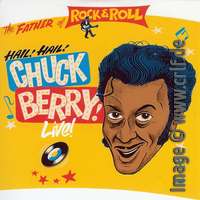
The two shows included are well known. Seven tracks come from a show recorded in February 1965 at the TV studios of Radio Télévision Belge in Waterloo, Belgium. This show was broadcast under the title "Face au public". It's available in very good quality on YouTube at https://www.youtube.com/watch?v=lhoyMlX5avU
It's interesting to note that Berry is backed by professional Jazz musicians from Belgium: Willy Donni on guitar, Willy Albimoor (Willy Noël De Moor) on piano, Ed Rogers (Roger Van Hoverbeke) on double bass, and Eddie Hunton on drums.
Besides his greatest hits, Berry also performs his latest singles and The Things That I Used To Do, a blues by Guitar Slim.
Further 14 tracks on this new CD come from a September 1980 show at the Seattle Arts Festival "Bumbershoot". Again this recording is of highest sound quality. It probably was recorded and broadcast by Seattle radio station KSIW. At least KSIW DJ Gary Crow introduces Berry and the band and promotes the radio station.
Fred, Thierry and myself spent some time trying to find out who backed Berry at this show. Crow introduces them as the "Northwest All Stars" and they are much better than the average pickup band Berry used to play with. The guitar player and the piano player both get time to solo which is a strong indication for Berry really liking their play.
With the help of Eric Predoehl and Ned Neltner we finally got into contact with guitarist Barry Curtis (ex-Kingsmen) and drummer George Rudiger (of Jr. Cadillac) from the band. Both Barry and George remember the show well. They report that the electric piano was played by Tom "Cadillac" Katica (Jr. Cadillac as well), who died in 2010. They didn't know the bass player who was traveling with Berry. This indicates that here again we hear Jim Marsala playing.
Eric has a great photo shot on his louielouie.net site showing Chuck, George, and Barry during the Bumbershoot show: http://www.louielouie.net/blog/?p=9074
Besides all his greatest hits, the show includes nice versions of You Don't Have To Go and Baby What You Want Me To Do written by Jimmy Reed as well as Lousiana Blues written by Muddy Waters. Note that in contrast to the known audience tapes, the show on this CD has been shortened. Due to time limitations, Johnny B. Goode was excluded, Reelin' And Rockin'/House Lights was shortened by two minutes. Also missing is the introduction by Gary Crow and an initial guitar instrumental based on Rockin' At The Philharmonic.
Right now we haven't seen this CD offered in stores or mailorder catalogs. It is offered on ebay, though.
A couple of weeks ago a new CD called Hail! Hail! Chuck Berry! Live! became available containing two shows which are really worth listening to. Although the CD says "This CD-R is a non commercial product and is for private use only", it is professionally made with a printed cardboard envelope. The label is called ROUGH. There is no catalog number, but the barcode reads 640509040147, so we take this as the catalog number.

The two shows included are well known. Seven tracks come from a show recorded in February 1965 at the TV studios of Radio Télévision Belge in Waterloo, Belgium. This show was broadcast under the title "Face au public". It's available in very good quality on YouTube at https://www.youtube.com/watch?v=lhoyMlX5avU
It's interesting to note that Berry is backed by professional Jazz musicians from Belgium: Willy Donni on guitar, Willy Albimoor (Willy Noël De Moor) on piano, Ed Rogers (Roger Van Hoverbeke) on double bass, and Eddie Hunton on drums.
Besides his greatest hits, Berry also performs his latest singles and The Things That I Used To Do, a blues by Guitar Slim.
Further 14 tracks on this new CD come from a September 1980 show at the Seattle Arts Festival "Bumbershoot". Again this recording is of highest sound quality. It probably was recorded and broadcast by Seattle radio station KSIW. At least KSIW DJ Gary Crow introduces Berry and the band and promotes the radio station.
Fred, Thierry and myself spent some time trying to find out who backed Berry at this show. Crow introduces them as the "Northwest All Stars" and they are much better than the average pickup band Berry used to play with. The guitar player and the piano player both get time to solo which is a strong indication for Berry really liking their play.
With the help of Eric Predoehl and Ned Neltner we finally got into contact with guitarist Barry Curtis (ex-Kingsmen) and drummer George Rudiger (of Jr. Cadillac) from the band. Both Barry and George remember the show well. They report that the electric piano was played by Tom "Cadillac" Katica (Jr. Cadillac as well), who died in 2010. They didn't know the bass player who was traveling with Berry. This indicates that here again we hear Jim Marsala playing.
Eric has a great photo shot on his louielouie.net site showing Chuck, George, and Barry during the Bumbershoot show: http://www.louielouie.net/blog/?p=9074
Besides all his greatest hits, the show includes nice versions of You Don't Have To Go and Baby What You Want Me To Do written by Jimmy Reed as well as Lousiana Blues written by Muddy Waters. Note that in contrast to the known audience tapes, the show on this CD has been shortened. Due to time limitations, Johnny B. Goode was excluded, Reelin' And Rockin'/House Lights was shortened by two minutes. Also missing is the introduction by Gary Crow and an initial guitar instrumental based on Rockin' At The Philharmonic.
Right now we haven't seen this CD offered in stores or mailorder catalogs. It is offered on ebay, though.
Posted by Dietmar Rudolph
in Chuck Berry Recordings
at
18:51
| Comments (0)
| Add Comment
| Contact Webmaster
Sunday, January 7. 2018
Yet another Carol

While Carol is one of Berry's best-known records, the recording itself is kind of a mystery. This starts with two different master tapes which have been used to create the hit single vs. the LP release. Most readers will know the LP master originally created for the 1959 album Chuck Berry Is On Top (CHESS LP 1435). This has a wide range of loudness throughout the song and is used for almost all LP or CD re-issues. In contrast, the master used for the 1958 single (CHESS 1700) is much more compressed to give a more leveled sound. To many people this variant sounds much more vivid and overall better.
The single master is more difficult to get as it was used only for the hit single and the follow-up EP. According to Thierry Chanu, the single master has been used only once since then, on the British album More Chuck Berry (PYE NPL-28028). In the US this master seems to have been lost which is why Bear Family in 2014 reconstructed it from a Vinyl single to re-issue it on their 16-CD box set.
Also lost are session tapes showing the development of the recording as well as the overdubs tried. So it came out as a surprise when in April we found a variant of Carol having an additional piano overdub which is not on the original single or LP release. This piano overdub version has been published only once: on the 1973 double album Chuck Berry's Golden Decade, Vol. 2.
This made us listen to Carol in greater detail trying to find a second release of this piano overdub. We didn't.
But in December Thierry Chanu found something else: On the Japanese 1983 box set Very Good!! (CHESS PLP 834-6) there is a third variant of Carol!! Again it sounds almost the same as the hit version but has additional piano playing. And this is a different piano overdub than the one on Golden Decade.
The piano overdub on this version is much more audible, but concurrently it's also worse. It doesn't fit the song very well. And the master runs approximately 5% faster than the hit version, whether on purpose or not. According to Morten Reff, this second piano overdub was also used on a second Japanese box set called From The Beginning 1955-1960 (CHESS SJET 9523-5) released probably in 1973. And Thierry found it on a strange European CD called Greatest (Goldies GLD63035, Portugal 1991).
Given these results we have to state that session tapes of the Carol overdubs must still have existed in 1973 as two alternative overdubs were used on compilation albums both in the US and in Japan. As these seem to have been lost in MCA's archives, one wonders if master tape copies still exist in Japan or elsewhere.
The single master is more difficult to get as it was used only for the hit single and the follow-up EP. According to Thierry Chanu, the single master has been used only once since then, on the British album More Chuck Berry (PYE NPL-28028). In the US this master seems to have been lost which is why Bear Family in 2014 reconstructed it from a Vinyl single to re-issue it on their 16-CD box set.
Also lost are session tapes showing the development of the recording as well as the overdubs tried. So it came out as a surprise when in April we found a variant of Carol having an additional piano overdub which is not on the original single or LP release. This piano overdub version has been published only once: on the 1973 double album Chuck Berry's Golden Decade, Vol. 2.
This made us listen to Carol in greater detail trying to find a second release of this piano overdub. We didn't.
But in December Thierry Chanu found something else: On the Japanese 1983 box set Very Good!! (CHESS PLP 834-6) there is a third variant of Carol!! Again it sounds almost the same as the hit version but has additional piano playing. And this is a different piano overdub than the one on Golden Decade.
The piano overdub on this version is much more audible, but concurrently it's also worse. It doesn't fit the song very well. And the master runs approximately 5% faster than the hit version, whether on purpose or not. According to Morten Reff, this second piano overdub was also used on a second Japanese box set called From The Beginning 1955-1960 (CHESS SJET 9523-5) released probably in 1973. And Thierry found it on a strange European CD called Greatest (Goldies GLD63035, Portugal 1991).
Given these results we have to state that session tapes of the Carol overdubs must still have existed in 1973 as two alternative overdubs were used on compilation albums both in the US and in Japan. As these seem to have been lost in MCA's archives, one wonders if master tape copies still exist in Japan or elsewhere.
Posted by Dietmar Rudolph
in Chuck Berry Recordings
at
13:05
| Comment (1)
| Add Comment
| Contact Webmaster
Saturday, April 8. 2017
First Facts on Berry's Posthumous Album

As announced on Berry's 90th birthday in October, the planned album CHUCK (Dualtone Music) was supposed to be released in March 2017. Obvious reasons now have postponed the release to June 16th.
While waiting for the release, we are trying to get some facts about the songs and the recording process. Anyway this is what should finally make it to our database - and as correct as possible. While we know about all the uncertainties regarding Berry's recordings in the 1950s and 1960s, it shouldn't be so difficult to get facts about recent recordings, should it?
Right now, some facts about the new album are public. Most of what's of interest for us, remains unclear, though. The contributors, some of which are reading and commenting here, seem to be under non-disclosure. So we have to stick with Dualtone's press releases and the liner notes excerpts reprinted in Rolling Stone magazine.
Berry has been talking about this album in interviews for at least 25 years including naming songs such as "Lady B. Goode". He must have had recorded parts or all already when in March 1989 a fire at his Wentzville farm destroyed both the recording studio and all of the master tapes.
Berry started re-recording the lost tapes shortly thereafter. He moved to digital recording techniques in the 1990s which allowed him to do the same cut-and-paste recording common with multi-track taping. Due to this we will probably never be able to set a date or even year of when a specific song from CHUCK was recorded. And we won't be able to tell where such recording took place and who played which instrument.
Listening to the single Big Boys released in advance, we hear that Berry's singing and guitar playing is not that of a 90-year-old. Even comparing it to the concert tapes made during the last 20 years, he sounds fresh. Therefore we can assume that at least the base track for this song has been recorded in the 1990s or early 2000s. According to an interview, at least six of the tracks had been ready by 1996. Not to forget that "Big Boys" was dubbed ready for release in an article celebrating Berry's 80th birthday in 2006.
Digital recording also allowed Berry to play more than one instrument. Thus while we are told that Jim Marsala, Bob Lohr and Keith Robinson worked as bassist, pianist and drummer on CHUCK, it might be for all songs, or just a few.
Besides Marsala and Berry's children Chuck Jr. and Ingrid, who toured with him during the last decades, the album also lists guest musicians such as Gary Clark Jr., Tom Morello and Nathaniel Rateliff as well as Chuck's grandson Charles III.
Tom Morello is the guitarist who provides the very unlike solo at the end of Big Boys, while Rateliff sings the background vocals. Whereas Morello has been a recording artist since the 1990s, both Rateliff and Clark are relatively fresh artists. This makes us believe that at least these guest artists have been overdubbed onto finished tapes during the last few years. While the liner notes list Clark Jr. on "Wonderful Woman", the guitarist himself says that he doesn't know which song his playing was used for. Berry Jr. explained that he and his son, that's Chuck III., finished their parts in Nashville in 2014 or 2015.
In addition to Big Boys we already know two songs from CHUCK: "3/4 Time" has been in Berry's touring repertoire for decades. Written by Tony Joe White and best known sung by Ray Charles, this is included in various concert recordings known from Berry since the early 1990s. A version of the Jazz standard "You Go To My Head" from 1938, written by Fred Coots and Haven Gillespie, has been recorded during the rehearsals for Berry's 1986 birthday movie. It didn't make it to the film but can be heard on the corresponding DVD set.
The remaining seven songs on CHUCK are written by Berry himself. This is the expected track listing:
Wonderful Woman [5:19]
Big Boys [3:05]
You Go to My Head [3:21]
3/4 Time (Enchiladas) [3:47]
Darlin' [3:20]
Lady B. Goode [2:55]
She Still Loves You [3:00]
Jamaica Moon [3:50]
Dutchman [3:47]
Eyes of Man [2:27]
Collectors should note that "Big Boys" was not only released as a download. Dualtone Music also released a CD single (DUA-1793-SI) containing just this track. It was sent as a not-for-sale promotional item to radio stations.
Many thanks to Lori Kampa of Dualtone Music for information about the album and PR single.
[Addition April 27, 2017: The song "Wonderful Woman" has been made available yesterday at https://youtu.be/kRFg9zUZnpU.]
While waiting for the release, we are trying to get some facts about the songs and the recording process. Anyway this is what should finally make it to our database - and as correct as possible. While we know about all the uncertainties regarding Berry's recordings in the 1950s and 1960s, it shouldn't be so difficult to get facts about recent recordings, should it?
Right now, some facts about the new album are public. Most of what's of interest for us, remains unclear, though. The contributors, some of which are reading and commenting here, seem to be under non-disclosure. So we have to stick with Dualtone's press releases and the liner notes excerpts reprinted in Rolling Stone magazine.
Berry has been talking about this album in interviews for at least 25 years including naming songs such as "Lady B. Goode". He must have had recorded parts or all already when in March 1989 a fire at his Wentzville farm destroyed both the recording studio and all of the master tapes.
Berry started re-recording the lost tapes shortly thereafter. He moved to digital recording techniques in the 1990s which allowed him to do the same cut-and-paste recording common with multi-track taping. Due to this we will probably never be able to set a date or even year of when a specific song from CHUCK was recorded. And we won't be able to tell where such recording took place and who played which instrument.
Listening to the single Big Boys released in advance, we hear that Berry's singing and guitar playing is not that of a 90-year-old. Even comparing it to the concert tapes made during the last 20 years, he sounds fresh. Therefore we can assume that at least the base track for this song has been recorded in the 1990s or early 2000s. According to an interview, at least six of the tracks had been ready by 1996. Not to forget that "Big Boys" was dubbed ready for release in an article celebrating Berry's 80th birthday in 2006.
Digital recording also allowed Berry to play more than one instrument. Thus while we are told that Jim Marsala, Bob Lohr and Keith Robinson worked as bassist, pianist and drummer on CHUCK, it might be for all songs, or just a few.
Besides Marsala and Berry's children Chuck Jr. and Ingrid, who toured with him during the last decades, the album also lists guest musicians such as Gary Clark Jr., Tom Morello and Nathaniel Rateliff as well as Chuck's grandson Charles III.
Tom Morello is the guitarist who provides the very unlike solo at the end of Big Boys, while Rateliff sings the background vocals. Whereas Morello has been a recording artist since the 1990s, both Rateliff and Clark are relatively fresh artists. This makes us believe that at least these guest artists have been overdubbed onto finished tapes during the last few years. While the liner notes list Clark Jr. on "Wonderful Woman", the guitarist himself says that he doesn't know which song his playing was used for. Berry Jr. explained that he and his son, that's Chuck III., finished their parts in Nashville in 2014 or 2015.
In addition to Big Boys we already know two songs from CHUCK: "3/4 Time" has been in Berry's touring repertoire for decades. Written by Tony Joe White and best known sung by Ray Charles, this is included in various concert recordings known from Berry since the early 1990s. A version of the Jazz standard "You Go To My Head" from 1938, written by Fred Coots and Haven Gillespie, has been recorded during the rehearsals for Berry's 1986 birthday movie. It didn't make it to the film but can be heard on the corresponding DVD set.
The remaining seven songs on CHUCK are written by Berry himself. This is the expected track listing:
Wonderful Woman [5:19]
Big Boys [3:05]
You Go to My Head [3:21]
3/4 Time (Enchiladas) [3:47]
Darlin' [3:20]
Lady B. Goode [2:55]
She Still Loves You [3:00]
Jamaica Moon [3:50]
Dutchman [3:47]
Eyes of Man [2:27]
Collectors should note that "Big Boys" was not only released as a download. Dualtone Music also released a CD single (DUA-1793-SI) containing just this track. It was sent as a not-for-sale promotional item to radio stations.
Many thanks to Lori Kampa of Dualtone Music for information about the album and PR single.
[Addition April 27, 2017: The song "Wonderful Woman" has been made available yesterday at https://youtu.be/kRFg9zUZnpU.]
Posted by Dietmar Rudolph
in Chuck Berry Recordings
at
11:55
| Comments (0)
| Add Comment
| Contact Webmaster
Monday, April 3. 2017
Piano Overdub on Carol recorded 1958 released 1973 found 2017

Back to our main interest here: documenting Chuck Berry's recordings as completely as possible.
Chuck's work for Chess records is known pretty well nowadays. We have heard the 1950s recordings over and over, first on their original releases, then on all the 1970s re-releases, next when transferred to CDs, then in complete by HIP-O Select and Bear Family. So we should know them by heart.
Then last week Willem Moerdijk asked me:
Willem included an MP3 of the version he found. It's a version most Chuck Berry collectors have sitting on the shelf. But yet it is different.
Get any of your records containing the 1958 hit Carol and listen to it. Now locate you old copy of Chuck Berry's Golden Decade Vol. 2. Carol is the very first track on side one. Play it. Hear any difference? Probably not. The singing is completely identical as is the guitar playing.
However, Willem is an expert on Jerry Lee Lewis. So he did not care about the guitar or the singing. He heard the piano. And he heard a different piano.
After a week of discussions and with the help of Arne's technical expertise (Thanks, Arne!) we finally have to agree with Willem.
The recording of Carol on Chuck Berry's Golden Decade Vol. 2 (Chess 60023, USA, 1973-02) is different indeed. It contains the exact same recording as the usual version, but there's another piano line. Listen for instance to the solo near the end of the song (at 2:33): On the 'new' version you can clearly hear the pianist performing a slide (glissando). On the 'common' version it isn't. There are some other piano differences at the beginning of the song and in between as well. The differences are minimal and you need to have a good and piano-trained ear to spot them.
Since the singing, the guitar, and even the original piano lines are exactly the same on both variants, it's clear that this is not a different recording/take. Instead it seems that Chess overdubbed another piano track onto the recording, probably because the original piano was pretty thin in the mix. Remember that in 1958 Chess recorded in Mono to a single tape. No way to enhance the original piano line later. Note that also the guitar was overdubbed, but this is identical on both variants, so must have taken place before the piano overdub. Why the enhanced variant did not make it to the original release, remains unknown.
The inclusion of this 'new' variant on Chuck Berry's Golden Decade Vol. 2 (again I show the much prettier UK cover) fits to the known facts about this strange release. Collectors had already found differing variants of Let It Rock (missing the guitar overdub) and Betty Jean (previously unreleased take) in this set. Since all three variants on Chuck Berry's Golden Decade Vol. 2 sound very much like their 'correct' releases, we doubt these were released intentionally. Especially as the liner notes don't tell anything. Or maybe some re-release engineer tried to tease us. In this case he succeeded for 44 years!
If you don't have the original 2-LP set, listen to other late 1970s re-releases. We have found the piano overdub on a few other albums. We haven't found it on any CD, though. If you do, let us know.
Many thanks to Willem, of course!
Chuck's work for Chess records is known pretty well nowadays. We have heard the 1950s recordings over and over, first on their original releases, then on all the 1970s re-releases, next when transferred to CDs, then in complete by HIP-O Select and Bear Family. So we should know them by heart.
Then last week Willem Moerdijk asked me:
According to your info, only one Chess take of Carol has been found. I think I may have found a second take. I noticed differences in the piano playing.
Willem included an MP3 of the version he found. It's a version most Chuck Berry collectors have sitting on the shelf. But yet it is different.
Get any of your records containing the 1958 hit Carol and listen to it. Now locate you old copy of Chuck Berry's Golden Decade Vol. 2. Carol is the very first track on side one. Play it. Hear any difference? Probably not. The singing is completely identical as is the guitar playing.
However, Willem is an expert on Jerry Lee Lewis. So he did not care about the guitar or the singing. He heard the piano. And he heard a different piano.
After a week of discussions and with the help of Arne's technical expertise (Thanks, Arne!) we finally have to agree with Willem.
The recording of Carol on Chuck Berry's Golden Decade Vol. 2 (Chess 60023, USA, 1973-02) is different indeed. It contains the exact same recording as the usual version, but there's another piano line. Listen for instance to the solo near the end of the song (at 2:33): On the 'new' version you can clearly hear the pianist performing a slide (glissando). On the 'common' version it isn't. There are some other piano differences at the beginning of the song and in between as well. The differences are minimal and you need to have a good and piano-trained ear to spot them.
Since the singing, the guitar, and even the original piano lines are exactly the same on both variants, it's clear that this is not a different recording/take. Instead it seems that Chess overdubbed another piano track onto the recording, probably because the original piano was pretty thin in the mix. Remember that in 1958 Chess recorded in Mono to a single tape. No way to enhance the original piano line later. Note that also the guitar was overdubbed, but this is identical on both variants, so must have taken place before the piano overdub. Why the enhanced variant did not make it to the original release, remains unknown.
The inclusion of this 'new' variant on Chuck Berry's Golden Decade Vol. 2 (again I show the much prettier UK cover) fits to the known facts about this strange release. Collectors had already found differing variants of Let It Rock (missing the guitar overdub) and Betty Jean (previously unreleased take) in this set. Since all three variants on Chuck Berry's Golden Decade Vol. 2 sound very much like their 'correct' releases, we doubt these were released intentionally. Especially as the liner notes don't tell anything. Or maybe some re-release engineer tried to tease us. In this case he succeeded for 44 years!
If you don't have the original 2-LP set, listen to other late 1970s re-releases. We have found the piano overdub on a few other albums. We haven't found it on any CD, though. If you do, let us know.
Many thanks to Willem, of course!
Posted by Dietmar Rudolph
in Chuck Berry Recordings
at
09:40
| Comment (1)
| Add Comment
| Contact Webmaster
Wednesday, March 22. 2017
Dualtone releases new Chuck Berry song

Dualtone had been very quiet about the new Chuck Berry album they announced in October. My guess is they kept quiet to have the media stay away from Chuck's last days.
Here's a message distributed tonight:
Accordingly, Dualtone Records makes available a first song called Big Boys from this album at their website:
http://dualtone.com/chuck_berry
Here's a message distributed tonight:
Since Chuck's passing on Saturday, the Berry family has received many inquiries from friends, fans and media about the status of his forthcoming album CHUCK, which was originally announced on his 90th birthday, October 18, 2016.
Working to prepare the release of this record in recent months and in fact over the last several years brought Chuck a great sense of joy and satisfaction. While our hearts are heavy at this time, we know that Chuck had no greater wish than to see this album released to the world, and we know of no better way to celebrate and remember his 90 years of life than through his music.
For months now plans have been in place, and preparations have been made with our friends at Dualtone Records to reveal further details and music from the album this week. As a tribute to Chuck Berry, and with gratitude to his fans around the world, we will be following through on those plans in the coming days.
The Berry Family
Accordingly, Dualtone Records makes available a first song called Big Boys from this album at their website:
http://dualtone.com/chuck_berry
Posted by Dietmar Rudolph
in Chuck Berry Recordings
at
10:00
| Comments (0)
| Add Comment
| Contact Webmaster
Saturday, February 20. 2016
Sheik of Chicago - new CD presents unreleased Chuck Berry material

The year 2016 starts with a new CD containing Chuck Berry recordings previously not released. Well, some. Well, not officially released. Well, and whether this CD is an official release is also questionable. Well, at least it looks like one.
Chuck Berry - The Sheik of Chicago (Smashing Pumpkin Records PMK-1126, 2016) comes in a cheap printed cardboard sleeve which claims to be printed in the E.U.
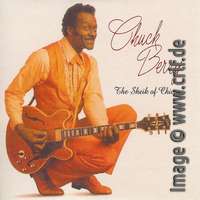
The CD has a playing time of almost 80 minutes consisting of a complete 1988 concert, segments from a 1981 concert, three nice short spots, and a tribute song to Chuck Berry by Joe Stampley.
The 1988 concert was recorded on New Year's Evening at the Palladium Theater in New York City. This concert had been broadcast through various U.S. radio stations and therefore this is a high-quality professional recording. The recording has been known from both audience tapes and more-or-less privately made bootleg CDs for a long time. One of these called Live at the Palladium even uses the same cover image.
While it's a high-quality recording, the performance is everything but high-quality. As he did for most of his career, Berry again uses a band he obviously has never seen before. Bass and rhythm guitar are inaudible, piano and drums are just bad. Chuck's daughter Ingrid helps out with harmonica and second vocal on a few numbers. She even gets to sing lead vocal on two blues numbers like we know from other concert recordings. All in all this concert is certainly not something you want to buy this CD for.
Following the 1988 concert are segments from a 1981 concert recorded in Reseda, California. This is much better but only 12 minutes long. Berry collectors and readers of this site know this performance for a long time. It has never been officially released for public sale. But it exists on Vinyl. These three songs have been included on a LP record sent by Westwood One to radio stations nation-wide to be broadcast as part of their In Concert radio series. Here it has been mastered digitally very well without any crackles and it's nice to have on CD now.
The first part of the former paragraph also holds for the next track. Berry's 20-seconds radio spot for the YMCA as recorded in 1967 was available on Vinyl before and has been discussed in detail on this site's section on Radio Station and Promotional Records. Here however, the transfer to CD did not go well. There are crackles, the beginning is fuzzy, and the overall sound quality is bad. However, as this recording is very rare we must be glad to be able to listen to it at all.
Jumping from 1988 to 1981 to 1967 next are two Chuck Berry recordings made in 2004. Both are speech recordings Chuck Berry did for Independence Air. The airline company Independence Air started flying in 2004 and filed bankruptcy in 2005, thus not being too successful. Besides trying to be cheap (always not a good idea) they also tried to be funny. This included that the in-flight safety announcements were spoken by comedians and other celebrities (see this old press-release).
Chuck Berry's safety announcements, to be used on their Bombardier CRJ200 (CL-65) jets, are spoken over a rock'n'roll instrumental (non-Berry). In 2004 you could download all the safety announcements from the flyi.com website. If you didn't, you now find it here on this new CD.
In addition the Pumpkin CD also includes a 30-seconds radio (?) commercial for Independence Air. In fact this is the only recording from this CD I did not know of and had before. I have not been able to find out where this spot was used and how it was distributed in 2004.
The last and 22nd track of this new CD is not a Chuck Berry recording at all. This is the song Sheik of Chicago, released in 1976 by Joe Stampley on EPIC. This Berry tribute is certainly one of the better ones and even made it to Billboard's Country Top 100.
If you are wondering about the nice and professional looking cover image, this has been cut from a contemporary (i.e. 1988) advert for Christian Brother's Brandy displaying Berry (click to enlarge).
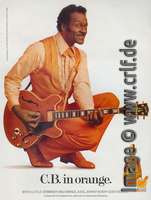
Overall this is not necessary a CD we have been waiting for. It does include some rarities though. Thus if you don't have the radio station albums and the Independent Air MP3s, get yourself a copy.
Chuck Berry - The Sheik of Chicago (Smashing Pumpkin Records PMK-1126, 2016) comes in a cheap printed cardboard sleeve which claims to be printed in the E.U.

The CD has a playing time of almost 80 minutes consisting of a complete 1988 concert, segments from a 1981 concert, three nice short spots, and a tribute song to Chuck Berry by Joe Stampley.
The 1988 concert was recorded on New Year's Evening at the Palladium Theater in New York City. This concert had been broadcast through various U.S. radio stations and therefore this is a high-quality professional recording. The recording has been known from both audience tapes and more-or-less privately made bootleg CDs for a long time. One of these called Live at the Palladium even uses the same cover image.
While it's a high-quality recording, the performance is everything but high-quality. As he did for most of his career, Berry again uses a band he obviously has never seen before. Bass and rhythm guitar are inaudible, piano and drums are just bad. Chuck's daughter Ingrid helps out with harmonica and second vocal on a few numbers. She even gets to sing lead vocal on two blues numbers like we know from other concert recordings. All in all this concert is certainly not something you want to buy this CD for.
Following the 1988 concert are segments from a 1981 concert recorded in Reseda, California. This is much better but only 12 minutes long. Berry collectors and readers of this site know this performance for a long time. It has never been officially released for public sale. But it exists on Vinyl. These three songs have been included on a LP record sent by Westwood One to radio stations nation-wide to be broadcast as part of their In Concert radio series. Here it has been mastered digitally very well without any crackles and it's nice to have on CD now.
The first part of the former paragraph also holds for the next track. Berry's 20-seconds radio spot for the YMCA as recorded in 1967 was available on Vinyl before and has been discussed in detail on this site's section on Radio Station and Promotional Records. Here however, the transfer to CD did not go well. There are crackles, the beginning is fuzzy, and the overall sound quality is bad. However, as this recording is very rare we must be glad to be able to listen to it at all.
Jumping from 1988 to 1981 to 1967 next are two Chuck Berry recordings made in 2004. Both are speech recordings Chuck Berry did for Independence Air. The airline company Independence Air started flying in 2004 and filed bankruptcy in 2005, thus not being too successful. Besides trying to be cheap (always not a good idea) they also tried to be funny. This included that the in-flight safety announcements were spoken by comedians and other celebrities (see this old press-release).
Chuck Berry's safety announcements, to be used on their Bombardier CRJ200 (CL-65) jets, are spoken over a rock'n'roll instrumental (non-Berry). In 2004 you could download all the safety announcements from the flyi.com website. If you didn't, you now find it here on this new CD.
In addition the Pumpkin CD also includes a 30-seconds radio (?) commercial for Independence Air. In fact this is the only recording from this CD I did not know of and had before. I have not been able to find out where this spot was used and how it was distributed in 2004.
The last and 22nd track of this new CD is not a Chuck Berry recording at all. This is the song Sheik of Chicago, released in 1976 by Joe Stampley on EPIC. This Berry tribute is certainly one of the better ones and even made it to Billboard's Country Top 100.
If you are wondering about the nice and professional looking cover image, this has been cut from a contemporary (i.e. 1988) advert for Christian Brother's Brandy displaying Berry (click to enlarge).

Overall this is not necessary a CD we have been waiting for. It does include some rarities though. Thus if you don't have the radio station albums and the Independent Air MP3s, get yourself a copy.
Posted by Dietmar Rudolph
in Chuck Berry Recordings
at
13:21
| Comments (0)
| Add Comment
| Contact Webmaster
Wednesday, March 25. 2015
The Johnny B. Goode Session

When Fred Rothwell a few weeks ago reported here on his new findings regarding the 'who-played-on-what' questions of Chuck Berry's discography, one of the most interesting changes to the Chuck Berry sessionography was made to the personnel which created Johnny B. Goode.
The session's recording contract encountered by Tim McFarlin during his studies of the Berry vs. Johnson suit of 2000-2002 lists Johnnie Johnson as piano player for the recording session dated January 6, 1958. According to what is listed in the discographies, this is the session in which Johnny B. Goode was recorded. Formerly, Fred and other experts had listed Lafayette Leake on piano.
Fredâs sessionography change first got various comments posted here on the blog and then resulted in almost two months of (sometimes heated) discussions in email to which Berry experts from the U.S., from the Netherlands, from England, France, Norway, and Germany contributed.
In the end we had to agree that we do not agree on a common opinion. However, as this topic is of interest to most Berry collectors I will try to sum up the facts and the most important opinions.
Speaking of facts we found that we have astonishing few 'hard facts' to base any discussion or result on.
This starts with the date of the session which generated Johnny B. Goode. Depending on which source you consult the reported recording date for this song is February 28, 1958 (Michel Ruppli, The Chess Files) or December 29, 1957 (Mike Leadbitter/Neil Slaven, Blues Records). Berry's Autography has the date listed as February 28, 1958 as well. Who is correct? We have some hints:
We know that Chess Records assigned the matrix number 8633 to the final recording and mix of Johnny B. Goode. We also believe that Chess assigned matrix numbers in the sequence the master tapes were finished. The matrix numbers directly following Johnny B. Goode were assigned to different artists: The Pastels (8634/35), The Lewis Sisters (8636-40), Harvey & The Moonglows (8641-43), and so on. The next numbers assigned to Chuck Berry records are 8656/57 (A and B sides of EP 5121 Sweet Little 16), 8689/90 (side 1 and 2 of LP 1432 One Dozen Berrys). The next Berry recording Around And Around is sixty numbers after Johnny B. Goode and got the matrix number 8693. This points to at least a couple of weeks between the mastering of Johnny B. Goode and that of Around And Around. And if we assume that mastering in the 1950s was done either concurrently with the recording or soon thereafter, this also points to a couple of weeks between the recordings of the two. As a sidenote: From later sessions we know that songs recorded the same day got master numbers a dozen or so numbers off, probably because the mastering of the later songs was delayed.
Of more interest are the master numbers preceding Johnny B. Goode. They all are assigned to Chuck Berry recordings: Sweet Little Sixteen (8627), Rock At The Philharmonic (8628), Guitar Boogie (8629), Night Beat (8630), Time Was (8631), and Reelin' And Rockin' (8632). This means that all these songs including Johnny B. Goode have been mastered/recorded in one session or a set of consecutive sessions, in any case so close to each other that no other masters were made in between.
This is the reason why both Michel Ruppli and Leadbitter/Slaven had all seven songs listed as a single session. If this would be true, Ruppli's session date of February 1958 cannot be correct because Sweet Little Sixteen was already in the stores by January. Chuck Berry's list of recording sessions as published in his book places the six early songs (masters 8627 to 8632) in a session dated January 6, 1958 while he puts Johnny B. Goode (8633) along with Around And Around (8693) and five other songs (masters 8694 to 8696) to February 28.
When compiling his sessionographies, Fred Rothwell took the most probable route. He placed the recording of the consecutive masters 8627 to 8633 close together, i.e. put Johnny B. Goode close to Reelin' And Rockin'. However, because we know that the released version of Sweet Little Sixteen was take 14 and the released version of Reelin' And Rockin' was take 10, Fred had strong doubts that all these were recorded the same day. It would have been an awful long session. Therefore he used the December date from Blues Records for Sweet Little Sixteen and Chuck Berry's January date for Johnny B. Goode. These recording dates are so close together that consecutive master numbers are probable.
The session contract encountered by Tim McFarlin during his research of the legal papers filed for the 2002 lawsuit lists a date and personnel, but in contrast to later contracts it unfortunately does not give us a list of songs recorded. Thus if we believe the recording contract — and we should as the other contracts make perfect sense —, we know that a session took place on January 6th, 1958 (the date from Berry's book) and that personnel included Johnnie Johnson on piano.
Is this a proof? No, because you can argue that we don't know of a contract for a December session (yet?), that there is no list of songs, that there may be other sessions between January and March 1958 (when Johnny B. Goode hit the stores). But placing the recording of Johnny B. Goode (and maybe the others) with the January session sounds reasonable given the information we have.
Other information we have is an audio protocol of what happened at the session which generated Johnny B. Goode. The recording tapes of this session have survived and have been released to the public. So they form some additional 'hard facts' we may base our discussion on.
From the tapes we know of three tries to record the song during this session. To judge the audio recordings one has to take into account that the released versions are not labeled correctly.
The correct sequence of the recordings has been discussed here in a blog post dated July 26, 2011:
Johnny B. Goode - take 1: was first released in 1986 on CHESS CH2-92521 "Rock 'n Roll Rarities" as the second part of a track named "Johnny B. Goode — previously unreleased version".
Johnny B. Goode - take 2: is a very brief take which starts correctly but is then interrupted. This second take has been released twice: Complete with the announcement "Johnny B. Goode Take Two" on Hip-O Select's "Johnny B. Goode - His complete 1950s recordings" and without this announcement but with a false start as the first part of the previously unreleased version on "Rock 'n Roll Rarities". Note that the sequence of the two takes is reversed on the 1986 release. Also note that the Hip-O set misses take 1 completely. It is only on the 1986 double album.
Johnny B. Goode - take 3: exists in two variants. The original recording of this take without any overdubs was first released on the Hip-O Select set in 2008.
Johnny B. Goode - take 3 including guitar overdub: This is the 1958 hit version. Like on many other recordings, Berry on take 3 played just the first part of the lead guitar intro but then continued playing the rhythm guitar. The remaining parts of the guitar intro as well as further guitar solos were recorded and overdubbed later, probably during the same session.
Again this provides us with some more facts, but how much of this can be considered as 'hard facts'? The takes are introduced as takes one, two and three. Take 3 is the basis of the final released record. So we can assume that there were no other takes. The final master (8633) however is a modified version of take 3. The most obvious modification is the addition of further lead guitar segments.
Another possible modification is a manipulation of the playback speed. It is known that Chess Records modified the playback speed of Sweet Little Sixteen to make Berry's voice sound younger. When a sound recording is played faster, the pitch becomes higher with the voices sounding lighter.
With Johnny B. Goode such a modification is not as obvious as with Sweet Little Sixteen. The running times of the undubbed take 3 and of the final master are almost identical. Whereas we have to keep in mind that we have access to the final master only in the form of 45 rpm records and digital copies like the one on the Hip-O Select box.
Just for academic purposes (and without any other use anyway) I have created myself an audio file in which one can hear the beginning of both variants of take 3 of Johnny B. Goode. The left stereo channel is the un-modified take 3, the right stereo channel contains the released master. One notices the overdubbed guitar which is now to be heard on the right channel only. And one can notice that there is a tiny difference in speed. It sounds as if the released master indeed has a slightly higher pitch and runs a little bit faster.
[I have asked Universal Music for permission to provide readers with a download link to this audio file. I have not received any permission nor any response at all, though (yet).]
What does this tell us about the recording session itself? Very little. We have no information when the guitar overdub was recorded and how. In the late 1950s there was no multi-track tape recording at Chess. Thus it is probable that the original take was played back into the studio where Berry then added the missing guitar lines. This is also where the speed difference may come from: The tape played back on a different machine and then re-recorded along with the solo guitar.
All we can tell for sure is that the mastering of the overdubbed take happened in temporal proximity to the mastering of Sweet Little Sixteen which in turn obviously happened before that song's release in January 1958.
In regard to the discussion on who was the pianist on Johnny B. Goode the differences between the three takes are relevant. Comparing the takes, it is obvious that Berry pretty much knew how he wanted the guitar to sound like. The main difference between the complete takes 1 and 3 is the piano playing. And how important this piano playing was becomes audible from the discussions taking place during take 2.
Take 2 starts just normal with the famous guitar intro. Then, when the piano comes in, someone shouts "hold it" and a dialog starts which I interpret as follows. To better understand the different sentences, I created another sound file in which I tried to level the loudness of those said through a microphone and those said without.
[Again I wanted to provide a download link to this sound-enhanced excerpt just for academic purposes but did not hear from Universal Music as the owner of this recording.]
I hear this dialog:
Voice 1 'Hold it, hold it, hold it!'
Voice 2 'What do you want, Jack?'
Voice 1 'You were making Roll Over Beethoven on piano that time, stay away from that!'
Voice 3 'Piano or guitar?'
Voice 2 'Keep playin' on the guitar during the solo.'
Voice 1 'Yeah, on the solo he was makin' Roll Over Beethoven. Stay away from that one!'
Voice 4 'Who is (he talking to)?' interrupted
Voice 1 'Johnny B. Goode, take three'
It is not clear which voice belongs to which person. In my opinion Voice 1, the main voice (on the microphone), is the voice of Jack Sheldon Wiener, engineer and from May 1957 to August 1958 co-owner of the recording studio at 2120 S. Michigan Av., Chicago. Jack is referenced and talked to in other segments from this session, e.g. in talks related to Sweet Little Sixteen and Reelin' And Rockin'. Voice 2, who instructs Berry to continue playing guitar during the piano solo, seems to be Leonard Chess. This fits to Berry's recollections of the session in his book where he writes: "Leonard Chess took an instant liking to this song and stayed in the studio coaching us the whole time we were cutting it." Voice 3 must be one of the musicians. Since he has no microphone I suspect this is the pianist asking. Voice 4 finally sounds like Chuck Berry to me.
Wiener obviously noticed that the piano solo on take 1 was too close to what they had released as Roll Over Beethoven. Berry himself did not care that much. He believed anyway that his songs differed in lyrics and solos alone. The rest was just standard. "Roll Over Beethoven, Johnny B. Goode, you name it, all of the songs could carry the same background or music that each other has." (Berry quoted by Tim McFarlin, see blog post of December 18, 2014)
I admit that both my interpretation of the studio dialog and my assignment of persons to voices is subject to discussions. The other Berry experts who listened to this studio talk had various different opinions. Some assigned Voice 1 to Leonard Chess, some even to Berry himself. Bob Lohr, who played piano behind Chuck Berry for the last decade, says:
The cat who stated "You were playing 'Roll Over Beethoven' ... stay away from that", and "he was playing 'Roll Over Beethoven' on piano" ... is clearly Chuck, not the engineer ... he's using the in-studio high quality vocal microphone and I'm 1000% sure it's Chuck ... after 18 years, I know his speaking voice like the back of my hand ... furthermore, the way Chuck pronounces "Beethoven" is pretty unique ... trust me, on my life I'm telling that was Chuck speaking, end of story!!! The engineer and LC [Leonard Chess] are speaking through the low quality studio talkback microphone.
I perfectly accept that Bob can identify Berry's voice as it sounds today. We should not forget that we are talking about a recording made when Berry was in his early thirties. Voices change and to me the instructing voice and the voice singing sound differently.
The main question the discussions about Johnny B. Goode circle around is the question "Who is the pianist instructed to stay away from playing Roll Over Beethoven". Some Berry experts point to Ellis "Lafayette" Leake, others favor Johnnie Johnson. Early discographies had listed Leake on piano, the ultimate discographical authority Fred Rothwell now lists Johnson as pianist — following the January 6 recording contract. It is unknown how the early discographies came to listing Leake. Fred writes in a recent article for "Now Dig This" magazine:
Session information about musicians has grown organically over the years and much of it has been based on anecdotal, word-of-mouth remembrances. In the '60s, blues fans would ask artists about old sessions and I'm sure guys like Willie Dixon, for instance, would try to placate them by giving info that was not always correct. Lafayette Leake was a big friend of Willie's and, I suspect, he got named as pianist for wont of someone else at times. Johnnie Johnson was not part of the Chess studio clique (he never recorded in his own name at Chess) and I think he may have been overlooked.
Those who favor Leake also say that both Berry and Johnson have denied many times over the years that Johnson was among the staff recording Johnny B. Goode. However, I was not able to find a single source for this claim. The only source to this effect is from Travis Fitzpatrick's biography of Johnson where he cites Johnnie saying "The only recordin' I didn't play on was 'Johnny B. Goode'. Chuck did that as a surprise for me."
Asked about this quote by Tim McFarlin and me, Travis said that when using Johnnie's quotes one should always keep in mind that Johnnie's interpretations and those of the reader might not necessarily match. The whole lawsuit between Berry and Johnson was based on the fact that to Johnson "writing music" was something completely different than what a copyright lawyer would understand thereunder.
Likewise, Johnson's saying that he did not play on Johnny B. Goode may not necessary mean "play piano", but more to the effect of "play a role" meaning "I did not contribute to Johnny B. Goode which I didn't know about before we went into the studio.".
In an 1999 interview with Ken Burke for the Rockabilly Hall of Fame (see http://www.rockabillyhall.com/DrIJJohnson.html) Johnson became more specific:
That's how we worked out all the tunes that's he's [Chuck Berry's] got practically, except "Johnnie B. Goode." I had nothing to do with that, that was sort of a tribute to me, I understand.
This is from Travis:
Since he is no longer around to clear it up, I can only guess what Johnnie meant with his original statement about not playing on "Johnny B. Goode." I probably should have questioned him more about it before he passed away. Remember, this is the man who said, "I didnât write the music with Chuck, I was just in the room sometimes when he was writing" before describing the process he and Chuck used to write their music! It was years before we understood the reason why he said this. Johnnie believed writing music meant writing down lyrics or transcribing notes onto a lead sheet. Johnnie called what he and Chuck did "making up music" because it wasnât written down. If you ever saw the movie Forrest Gump, that was very much how Johnnie viewed the world. As a consequence, more misunderstandings are coming to light. For example, Johnnie didnât think he played on the early Mercury sessions because he thought the re-recording of all their Chess hits was due to a fire at Berry Park destroying the originals. He thought Chuck arranged to re-record the old songs on his own! That was Johnnie in a nutshell.
Whether or not Johnson or Leake played piano during the Johnny B. Goode session is still open to discussion. One would think that people who know Johnson's playing well can simply hear whether it's him playing. In the same 1999 interview Ken Burke asked Travis Fitzpatrick: "Even as low in the mix as some of Johnnie's piano work is, would you know his playing when you heard it?"
Travis replied:
Sure. I can always tell his playing. [...] I can listen to a lot of those songs and tell it's him. When I listen to some of those original Berry records I can say "That's Johnnie for sure!" I can tell that Lafayette Leake came in on some stuff, especially "Johnnie B. Goode." I can tell that's not Johnnie. Then, like he was saying, there's this whole thing where Leonard Chess would come in during his solo and run his hand up and down the keys, which Johnnie never does. So, that kind of made it more difficult, plus Lafayette Leake was a very good mimic. [...] But I'm 100% sure that was Lafayette Leake on "Johnnie B. Goode."
Another expert on Johnnie's piano playing is Bob Lohr. Bob is a pianist himself and has played with both Berry and Johnson. He likewise claims that he can identify Johnson's playing, too:
I'm extremely familiar with JJ's [Johnnie Johnson's] style. I have been called upon here in local studios over the years to 'clone' or mimic JJ's style on different projects as JJ's style is pretty much ingrained in my musical DNA. Based upon my familiarity with JJ's style, I would have to say that it was clearly LL [Lafayette Leake] instead of JJ on JBG [Johnny B. Goode] based upon style alone. The stylistic differences between LL and JJ makes me sure that LL was the man on the keys despite the union log of the date. They both played in a similar boogie/blues mode behind Chuck (and often on the same out-of-tune piano apparently!!!), but Leake ... with all due respect to JJ ... was a far more fluid and accomplished jazz player and generally threw in some nice fat jazz double-hand chording at the end of his solos ... something that JJ rarely if ever did. You'll hear Leake do this throughout Takes 2/3 and on the final take as well.
Interestingly, both experts did not know that take 1 of Johnny B. Goode existed which has a very different piano playing and was released only on the 1986 double album. When I asked them to re-check take 1, Bob Lohr found: "You are correct in that it sounds a lot like JJ's style, although I can still hear the stylistic difference."
Travis Fitzpatrick was even more astonished:
I must revise my opinion (an ultimately my book) concerning Johnnie Johnsonâs playing on "Johnny B. Goode." Until Dietmar pointed it out, I did not realize that take one was misplaced as take three on Rock 'n Roll Rarities. Consequently, I never really listened to it. Well believe me ... I have now listened to it. I listened to that first take of "Johnny B. Goode" for hours last night. My immediate reaction was "Holy COW! The AFM contract was right! That is Johnnie Johnson!" Just to be sure, I jumped into my Johnnie recordings both issued and unissued and found examples of every lick. His phrasing and the way he resolves his licks is Johnnieâs fingerprint. It is him. The flashiest lick has been right under everyoneâs nose. Watch the rehearsals for "Carol" in Hail Hail Rock and Roll or better yet, Johnnieâs backing behind the sax on "Almost Grown" in Hail Hail Rock and Roll. Those songs are in C and G respectively, but you can see that the lick is in his repertoire and in fact, he uses it quite a bit. Just not on most of the Chuck Berry recordings — which is why it hasnât become recognized as a standard JJ lick.
Travis' remark on the song keys is significant because Johnny B. Goode is written in B flat (Bb). Bob Lohr again:
It's harder to play Chuck's style (or blues in general) in the flat keys ... E flat (Eb) or B flat (Bb). Johnnie was not too good at playing in those keys and would never use those keys when playing in his own band. LL on the other hand, was technically a much more accomplished classically-trained/jazz player who could play almost as well in Bb or Eb as JJ could play in G. JJ could certainly play in B flat or E flat, but nowhere near as well and as fluid as LL plays here in B flat. If in fact JJ played on JBG, he played in a completely different style which we have never heard before or since from JJ ... and better in B flat than he ever played before or since.
Bob's statements about Johnson's facility in playing jazz licks or playing in B flat at all had Travis to disagree:
Regarding Johnnieâs proficiency in B-flat and as a jazz musician: Johnnie Johnson was playing jazz professionally in Detroit at age seventeen. As a nineteen-year-old Marine, he was handpicked by Bobby Troup to play piano in the Barracudas, a USO service band featuring members of Glenn Millerâs, Tommy Dorseyâs, and Count Basieâs orchestras. After WWII he returned to Detroit where big band jazz and swing had gone out of style and he had to learn bebop like Dizzy Gillespie and Bud Powell to get jobs. Johnnie could play "How High the Moon" in every key; I saw it with my own eyes when he was giving me lessons. His trio in Chicago, with Milton Rector on bass, was a jazz combo. The Johnnie Johnson (or Sir Johnâs) Trio was a jazz combo when they started at the Cosmopolitan Club — remember, Chuck replaced a saxophone player. If you asked Johnnie to list his piano heroes, they were all jazz greats, no blues and certainly no rock pianists. His idol was Oscar Peterson. Johnnie knew jazz very, very well. Defining the limits of Johnnieâs jazz ability based on what he played with Chuck Berry and on his blues albums is like determining someoneâs knowledge of chess by how he plays checkers. Johnnieâs favorite keys were G, C, B-flat, F, D and E-flat. He did not like the way A sounded (thought it was too bright), he played E grudgingly, and he absolutely hated C sharp/D-flat and B. So yes, if you just turned him loose on a blues or rock song, he would do what he enjoyed and what came easiest to him. I have a recording of Johnnie playing "Johnny B. Goode" at the Rock and Roll Hall of Fame. It is in the original B-flat, and he nails it. We even had the rest of the band pull out so he could show what it sounded like on piano. I can think of at least one great live blues off the top of my head that he does in B-flat as well. And he used to do this gospel style breakdown playing "Maybellene" live with Chuck that was really cool. The point being, Johnnie was very good in B-flat.
At this point we have moved far away from the 'hard facts' issue we started this article with. We're now down to rely on expert opinions — the same way a judge would have to rely on expert testimonials. Like a judge you will have to come to your own conclusions.
One thing both of our experts have not taken into account enough is — at least in my personal opinion — that during the change from take one to take three Jack Wiener (or whoever) clearly instructs the pianist to play in a completely different style. This can be a good reason why Johnnie Johnson does not sound like Johnnie Johnson on the final recording.
All in all I finally agree with Fred Rothwell's sessionography change. Whether you do depends on how you judge the various facts and opinions by yourself. This lengthy article should give you everything to come down to your own decision.
[Many thanks to all the Berry experts who provided useful information during the creation of this article, most notably Fred Rothwell, Morten Reff, Josep RullĂł, Bob Lohr, Tim McFarlin, Travis Fitzpatrick, Michel Ruppli, and Arne Wolfswinkel.]
Posted by Dietmar Rudolph
in Chuck Berry Recordings
at
16:12
| Comments (0)
| Add Comment
| Contact Webmaster
Thursday, March 19. 2015
The Chuck Berry Tokyo Sessions

In 1981 Chuck Berry toured Japan for the very first time. EMI / EASTWORLD of Japan recorded at least two of the shows and released the highlights as an LP called Chuck Berry Tokyo Session.
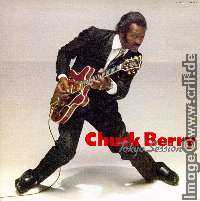
Because this album was distributed in Japan only, it is one of the rarer official Chuck Berry LPs.
A couple of weeks ago and within a few hours two readers of this site informed me about a video on YouTube which is related to this album - and which changes some data we thought to know about the album.
Here are a few pages from the 1981 tour promotional book courtesy of Claude Schlouch collection:
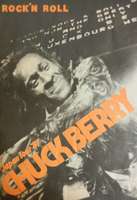
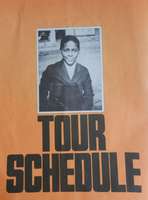
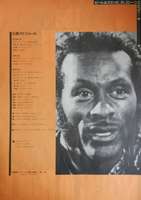
If you cannot read Japanese (such as I), here's a translation of the most important facts, i.e. the venues and dates:
| Date | Time | Town | Concert Hall |
|---|---|---|---|
| Thursday, April 23, 1981 | 6:30 PM | Nagoya | Aichi Kinro-Kaikan |
| Fridayday, April 24, 1981 | 6:30 PM | Osaka | Osaka Festival Hall |
| Monday, April 27, 1981 | 6:30 PM | Tokyo | Shinjuku Kosei-Nenkin Hall |
| Tuesday, April 28, 1981 | 6:30 PM | Tokyo | Shinjuku Kosei-Nenkin Hall |
| Wednesday, April 29, 1981 | 1:00 PM | Tokyo | Shibuya Kokaido |
According to the information printed on the album cover, the LP's ten or eleven songs (Carol as usual blends into Little Queenie to form a medley) were recorded during the third and fifth show of this tour. The album cover does not tell which song was recorded where. Fred Rothwell therefore had listed the album's first side with the April 27 concert and the second side with the April 29 concert, though saying that this is just a pure guess.
Now back to YouTube. Using the link https://m.youtube.com/watch?v=R6a6H8Cmrcc you'll find a video called Chuck Berry - Tokyo Session (1981) uploaded April 2014. It's not a video at all, just an audio recording played to a fixed image of the tourbook and a ticket. Both the ticket and the YouTube explanation say that the audio was recorded on April 29, 1981 at Shibuya Koukaidou. This means that this is from the same show also the LP was cut from.
This however is NOT - as one would asume on YouTube - a bootleg copy of the LP album. Instead it is a live recording which has no duplicates with the album - songs which are on the album and in the video are different.
If we assume that the date and location of the Youtube audio track are correct and if we consider the high quality of the Youtube recording, my theory is that the unknown poster had access to the concert recording segments which were not used for the LP.
The YouTube show starts with an MC introduction and ends with Berry's typical closing routine. However, this is not a complete show. If you listen closely you will find that it consists of two parts glued together. There is a break right after Let It Rock and before the Carol medley. And if we assume that Berry played his usual set of 60 minutes (according to one collector, Japanese concerts typically last only 45 minutes) there is a segment missing in the middle of the YouTube video.
In my opinion we have here the beginning and the end of the Shibuya Kokaido concert, while its missing middle part has been used for the album. If it is, we can listen to the album and see if we can find out which songs might fit into the middle of this 29th concert - and which songs are definitely not, thus have to be from the 27th. I just did. This is my list of comments. Please check for yourself.
LP side A:
- School Day - might be a separate track since Roll Over Beethoven starts pretty surprisingly
- Roll Over Beethoven and Wee Wee Hours flow into each other pretty continuously (which could be a post-processing trick, though)
- Wee Wee Hours starts with the Blues explanation. Since that is on Sweet Sixteen on the YouTube recording, it's probable that this track is from a different concert, i.e. from the 27th.
- My Ding-A-Ling is separated from Wee Wee Hours. It includes Ingrid's introduction, though, and as such must also be from the 27th.
- Memphis follows My Ding-A-Ling smoothly and since the Youtube recording has no space to put another Ingrid track in, this has to be from the 27th as well.
LP side B:
- Sweet Little Sixteen blends smoothly into Rock and Roll Music
- Rock and Roll Music is in the YouTube video and different, thus has to be from the 27th.
- Carol/Little Queenie as well
- Bio has no audible gap to the Carol/Little Queenie medley before and to Johnny B. Goode following.
- Johnny B. Goode again can be found in a different version as part of the YouTube video.
Thus of all LP tracks only School Day fits into the middle of the YouTube recording. The most probable sequence of the songs therefore is:
April 27th:
- Roll Over Beethoven (LP)
- Wee Wee Hours (LP)
- Sweet Little Sixteen (LP)
- Rock And Roll Music (LP)
- Carol / Little Queenie (LP)
- Bio (LP)
- Johnny B. Goode (LP)
- My Ding-A-Ling (LP)
- Memphis (LP)
- (probably) Reelin' And Rockin' or some other closing routine (unreleased)
April 29th:
- Roll Over Beethoven (YouTube)
- Rock & Roll Music (YouTube)
- Sweet Sixteen (YouTube)
- Let It Rock (YouTube)
- School Day (LP)
- Carol / Little Queenie (YouTube)
- Johnny B Goode (YouTube)
- My Ding A Ling (YouTube)
- Reelin' And Rockin' (YouTube)
Fred agreed to use this sequence in further editions of his discography - until we get more data.
[Many thanks to Claude Schlouch, Thierry Chanu, and Naoki Suzuki for help with this article.]
Posted by Dietmar Rudolph
in Chuck Berry Recordings
at
11:52
| Comments (0)
| Add Comment
| Contact Webmaster
Sunday, November 16. 2014
The hidden gems in Bear Family's new 16-CD box

Bear Family's original marketing material for Chuck Berry: Rock And Roll Music â Any Old Way You Choose It (Bear Family BCD 17273 PL) promised "all of Berry's studio recordings for Chess, Mercury, and Atco plus a selection of live performances." If you're a die-hard Berry fan or collector you probably already have all the relevant releases and that means all the studio recordings and all the live recordings. Thus except for the beautiful books, is there any reason for you to spend $400/âŹ300 for this box?
There is! The reason is that every single one of the 16 CDs comes with at least one hidden gem which you might want to have. Let's run through them:
CD 1
The first CD contains the studio recordings up until May 1957 including the two Joe Alexander tracks.
The hidden gem is La Juanda (or Lajaunda as it was incorrectly named by Chess). As you know from this blog, there are two slightly different versions of this song. The two versions differ in the overdubbed second vocal track. On this CD 1 we get to hear the version which was originally used on the CHESS 1664 single - and only there. All later EPs, LPs, and CDs in contrast included the other variant. Thus the single version of La Juanda is included here for the first time on CD.
CD 2
The second CD contains all the Chess recordings made between December 1957 and September 1958.
The hidden gem here is Carol. If you compare this track to the well known and indefinitely repeated version which you hear on all other CDs it will come up as a true surprise. While we are used to Carol sounding dull and dark, it now sounds light and clear. Finally someone took the original recording and released it in full sound quality just as it was on the original Chess single.
CD 3
The third CD covers the Chess recordings between November 1958 and early 1960.
The hidden gem on this CD is indeed an unheard-of Chess recording. Titled Fast B6 this is another instrumental/jam/warm-up from the Chess session tapes. For the first time we hear this previously unreleased Chuck Berry recording - or should I better say Johnnie Johnson recording.
CD 4
The fourth CD completes the session which ended CD 3 and runs until August 1964.
It contains no less than three hidden gems. First you will find I'm In The Twilight Zone which had been available on a promotional-only CD before but was omitted from the Hip-O Select set You Never Can Tell - His Complete Chess Recordings 1960-1966 (HIP-O-Select B0012485-02).
Also missing from this set but on this CD - and for the first time on CD at all - are the shortened versions of the songs Chuck's Beat and Bo's Beat such as they were first released on the single Checker 1089.
CD 5
The fifth CD starts with a session of December 1964 and runs âtil the end of 1965.
There is no direct hidden gem on this CD but we will come back to it when talking about CD 11.
CD 6
The sixth CD covers the last session for Chess in April 1966 and continues with the Mercury sessions up to March 1967.
This CD not only contains the Mercury recordings which were on the original vinyl albums. It also includes all those additional songs which were not on the original releases but hidden on the 1980s re-releases. As those 1980s CDs have been extremely hard to find, the whole Mercury stuff is a reason to buy this box. And yes, in my opinion some of the Mercury recordings are gems indeed.
But besides that also this CD contains a hidden gem. The song Oh Captain was originally released on the album Mercury SR-61176 From St. Louie To Frisco. It always sounded strange as the two stereo channels were not in sync but offset for several seconds. This might have been by intention of artist or producer, though. Hey, it was hippie-era San Francisco where the album was finished. But it might also be just a technical fault which happened. There is no definitive answer, but Chuck Berry in an interview once complained about Mercury having destroyed his recordings.
Due to this, some Berry fan, said to be a Swedish sound engineer, had ârepairedâ the song by bringing the stereo channels back in sync. This repaired version has been floating around the Berry collectorsâ community for many years. CD 6 now comes with an "official" synchronized version of Oh Captain, engineered by Mark Kennedy. This version clearly sounds much better than the originally released mess â at least to our ears. It may not have sounded better to a 1968 SF sound engineer on dope, though.
CD 7
The seventh CD completes the March 1967 session, runs through the remaining Mercury sessions and even includes the first session back at Chess from November 1969.
Again there is a hidden gem on it. Plus a correction for those who own the 1989 CD release of Concerto In B Goode. If you do, you will welcome that there is now a track separator between Put Her Down and Concerto In B Goode. On the early and so far only CD reissue this track separator was forgotten so you couldnât access the 18 minute concerto.
But the true hidden gem is a version of Rock Cradle Rock we haven't heard before. The new version of this tune is not really an alternate recording but a different mix having some guitar solos added. This brings the originally very short (1:22 minute) song to at least 1:51 minutes and indeed makes it better.
CD 8
The eighth CD continues in November 1969 and includes the studio recordings up to February 1972.
The hidden gems on this CD are two edited versions which have been available before only on vinyl. Both Johnny B. Goode and Reelin' And Rockin' from the London Chuck Berry Sessions live album had been edited to fit on the singles they appeared on. While the full length versions have been re-released often, these two edits are available on CD here for the first time. In case you ask: the version of Reelin' And Rockin' is the edit for the US single Chess CH-2136.
CD 9
The ninth CD starts in February 1972 and continues until August 1974.
Collectors will immediately notice a song called You And My Country which had not been listed on the 2010 Hip-O Select set Have Mercy â His Complete Chess Recordings 1969 To 1974 (HIP-O-Select B0013790-02). However, the recording itself is on the Hip-O set, though called Me And My Country. That was an error because You And My Country is both the original title under which this song first became known when its lyrics were published in the songbook RockânâRoll Poet and it is what Berry sings about.
The hidden gem on CD 9 is an edited version again which was only available on vinyl up to now. Bio had been edited down half a minute to fit on the US single Chess CH-2140. CD 9 contains this edited version, while the unedited version is on CD 10.
CD 10
The tenth CD contains the remaining Chess studio sessions from August 1974. Plus.
I tried hard, but didn't find any hidden gem on this CD. It does include the full-length versions of three songs which were in edited form on CDs 4 and 9, though.
CD 11
The eleventh CD contains the 1979 studio recordings published on the Atco album Rockit SD 38-118, but starts with 14 Chess recordings from the early 1960s.
This includes various, significantly different stereo versions of well-known Chess songs. These had been published in the 1960s and 1980s. Also included are a few alternate takes - and two hidden gems.
The first hidden gem on CD 11 is the stereo version of Diploma For Two which had not been available on CD before. The second hidden gem is even more interesting. Jamaica Farewell on CD 11 is the version from the UK variant of the Chuck Berry In London album (Chess CRL-4005). This is a different recording/take from the one published in the US which is on CD 5. The differences are minor and except for the differing run time hard to spot, but this version is here for the first time on CD. It was even omitted from the Hip-O sets.
CD 12
The twelfth CD contains three Chuck Berry concerts from 1956, 1958, and 1963.
The whole 1963 show is a hidden gem as it was not heard before. From the discography we learn that Chess recorded four shows with Berry on October 25 and 26, 1963 at the Walled Lake Casino, Detroit. Only the two Saturday shows had been released on the Hip-O Select set You Never Can Tell - His Complete Chess Recordings 1960-1966 (HIP-O-Select B0012485-02) and even those incompletely. Here is the complete first show of Friday which was not on the Hip-O set.
CD 13
The thirteenth CD continues with the Walled Lake Casino recordings containing the complete second set of Friday and the complete two sets of Saturday. Of these three shows the first has not been available before. The other two were known for the most part, though both Memphis and the spoken introduction were omitted from the Hip-O release. Even though there are some duplicates when Berry played the same song in multiple shows, there are also some numbers such as Dust My Broom and Too Much Monkey Business which are not often heard in Berry concerts. With the two sets of Friday, October 25, 1963 we get some new and interesting stuff which had been unreleased so far.
CD 14
The fourteenth CD contains the 1967 recordings made in San Francisco and first released on Berry's first official live album Mercury MG-21138/SG-61138 Live At Fillmore Auditorium. When that album was re-released on CD in 1989, Mercury added five more songs from the shows. CD 14 of the Bear Family box contains the exact contents of that 1989 CD, i.e. the more complete recording. The only difference is that here the 8:36 minute medley which starts the show is logically divided into three individual tracks.
CD 15
Very well known is the chronologically next live recording from Toronto 1969 which takes up the full fifteenth CD. This concert has been re-released on albums and CDs dozens of times. There seems to be a complete tape of this concert somewhere as several of the cheap releases include spoken introductions, stage banter and reaction to audience input. CD 15 however includes the cut-off separated songs as they were originally released on the album Live In Concert by Magnum.
The hidden gem which was not heard on this and any other releases is a version of Goodnight, Sweetheart, Goodnight called Bonsoir Cherie which had been available before only on the video and DVD releases of this concert.
CD 16
The sixteenth and last CD of this set contains several live recordings from the 1970s plus one rare studio recording and some tracks which you can count as a live recording or a studio recording just as you want to.
From 1972 there is the concert from Coventry which was used for the second side of Chess album CH-60020 The London Chuck Berry Sessions. Three songs, Reelinâ And Rockinâ, My Ding-A-Ling, and Johnny B. Goode, were released both on this album and in heavily edited form on several Chess singles. A fourth song, Roll âEm Pete, was even overdubbed with additional instruments and released as the flip side of Chess single CH-2140. As said above, these edited versions can be found on CD 8 of this box, some for the first time on CD at all. The original long recordings are on this CD 16 along with four more songs from this show which were first released in 2010 on the Hip-O Select set Have Mercy â His Complete Chess Recordings 1969 To 1974.
The first hidden gems on CD 16 are two additional songs from the Coventry show plus a short instrumental and an introduction. All four tracks are released here for the first time.
In 1964 during his first tour in England, Berry and his backing band The Dominoes played some numbers at the BBC Studios for the BBC Saturday Club radio show. There was no audience, so you may argue if this is a live or studio recording, but who cares. Parts of this recording had been available before on a vinyl album Dominoes & King Size Taylor (excerpts only) and on a poor unofficial CD Chuck Berry In London (some tracks only and in lousy sound quality).
Thus the second hidden gem on CD 16 is that for the first time we hear the five songs complete and in very good quality. Interestingly some crackles suggest that these five songs have been transcribed from a vinyl recording, though one that wasnât available to the public.
The list of hidden gems continues with the last three tracks on CD 16. First you get the 1977 recording of Berry's version of the Dr Pepper advertising song along with the corresponding interview. Then again from 1977 there is the final live recording in this selection. This medley of Reelinâ And Rockinâ and Roll Over Beethoven was recorded for the motion picture American Hot Wax about Alan Freed and as such was released on the corresponding soundtrack album. All three tracks had been available on vinyl only and are here on CD for the first time.
Summary
Thus, is the 16 CD box worth its price even if you already have all of Berry's released recordings? Definitely!
Every single one of this 16 CDs contains some hidden gem. If you'd see a single CD offered at $20 which would contain only one of those hidden gems, wouldn't you buy it?
Here we get sixteen of these! We get most of the contents of the 12 Hip-O CDs. We get the complete contents of the five Mercury CDs, each of which alone easily sold for $50, if offered at all.
And as hidden gems we get:
- one song which was forgotten on the Hip-O sets
- twelve tracks which were available on vinyl only before
- three studio recordings which had not been available before at all, and
- twenty-five (!) live recordings - all unreleased until this great box arrived.
Posted by Dietmar Rudolph
in Chuck Berry Recordings
at
12:34
| Comments (3)
| Add Comment
| Contact Webmaster
Wednesday, November 5. 2014
Seven Pounds of Berry

Chuck Berry: Rock And Roll Music â Any Old Way You Choose It
Bear Family BCD 17273 PL, 16 CDs, 350 pages in two books
Collectors of our kind of music already know: When Bear Family takes care of one of our favorite artists, you can purchase the result without any doubt, no matter if they cover Bill Haley, Jerry Lee Lewis, Carl Perkins, or as here Chuck Berry. So why write a review then? Because there are collectors who think more than twice when a box comes with a price tag of 300 Euros (or $400). So what do you get for the money?
One thing you will get is simply everything, no less than the total musical works of Chuck Berry. Just turned 88, this pioneer of rock music in the 1950s, 1960s, and 1970s worked for the labels Chess, Mercury, and Atco. During these times more than 300 studio recordings originated. And all of them are in this box.
The Chess recordings had been reissued in 2008 to 2010 by Hip-O Select, a sub-label of Universal Music. Likewise the Atco recordings are available on CD.
But here we also get the Mercury recordings (1966 to 1969). While there had been a CD reissue in the 1980s, those were pressed in very little quantity and are extremely hard to find. Which is a pity because also in the late 1960s Berry recorded several interesting songs. One highlight are the tracks recorded in Memphis together with a set of musicians who later performed with Elvis on numbers such as In The Ghetto or Suspicious Minds.
So we get Berry's complete studio work including his Mercury period. Which makes up for a total of 11 CDs. These CDs have been compiled in a way that every Rock'n'Roll fan may want to listen to an arbitrary one without getting bored. This is in contrast to the Hip-O Select sets which got lost in alternative takes presenting multiple versions of the same song in sequence often. With this Bear Family Box, there is only one version each, the most well-known variant. Only with a small selection you may find a second variant hidden on a different CD, e.g. where the hit version had been highly modified against the original album version.
In addition to the complete studio history of Berry, five further CDs show an interesting comparison: a cross section through his live performances of that time. This starts with segments from an Alan Freed show in 1956 and ends with the stage recordings made for the Alan-Freed-Memorial movie "American Hot Wax" in 1977. Included are several recordings which had been available before only on rarest vinyl or not at all.
Bear Family would not Bear Family, though, if these twenty hours of music weren't accompanied by writings at least as interesting. And therefore this box does not only come with one album-sized book, it comes with two!
The main book was written by three authors, each of whom having written one or more books on Chuck Berry already. Bruce Pegg not only tells Berry's story on more than 100 pages, he also describes the circumstances of recording sessions and the origins of the songs. Fred Rothwell, who also acted as a producer for this box, added more than 30 pages of discography listing in detail each and every recording, musician, and important release. Morten Reff as the second producer not only made sure that in this collection all those tracks are found which had been missing on CD before. He also opens his archive of international record covers for us.
Due to this you not only find all the US covers displayed, but also the most beautiful records from all over the world, ranging from South Africa to New Zealand - of course in full color and best quality. Next to these there are approximately 1.000 photos: views into the recording studios, performances world-wide, concert posters, advertisements and so on. Many of these photos can be seen here for the first time, or at least for the first time in this outstanding quality.
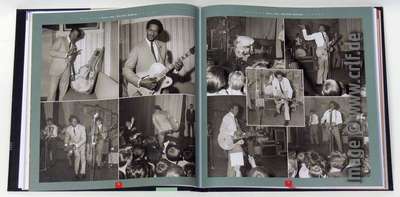
Chuck Berry at the Star-Club, Hamburg, June 1964
Which takes us to the second book from the box which tells of a sensational discovery: In 1996 journalist and blues expert Bill Greensmith gets a message from a friend regarding a photographic archive due to be dumped. In three rooms filled with hundreds of boxes Greensmith encounters some early Chuck Berry pictures. The house owner explains to him that the photographer, her husband Harry Davis, was a cousin of Berry. This was when Greensmith started to look through negative after negative.
His findings are astonishing: Not only had Davis shot Berry's wedding photo. He is also the originator of many of the early PR photos. Already in 1952 Davis takes first portraits of Berry with guitar and stage suit. Some shots from this or other early photo sessions were used by Chess for covers and songbooks even ten years later. Most of the photos have been unknown, though, until they are shown now within this box.
Whereas it doesn't stop with the publicity shots. Harry Davis and his camera also joined Berry at performances in St. Louis, e.g. in the Cosmopolitan Club. Thus on Harry's photos we see Chuck Berry and Johnnie Johnson on stage, several month before their first hit record.
The most interesting negatives, transparencies and prints Bill Greensmith restored and collected for this book. They are shown in large format, in astounding good quality, some even in color. This is a true gem, not only for Berry fans.
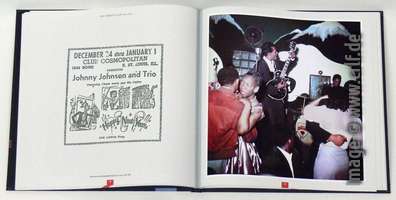
Chuck Berry at the Cosmopolitan Club, St. Louis, 1954
The text from the books and the uncounted stunning photos almost make for the price of the box by themselves. And in addition you get the bonus of Berry's total musical work on 16 CDs. Even if you think you already have everything by Berry, you will read or hear things yet unheard-of such as an insider's look into Berry's UK tour 1965, an advertising song for the Dr Pepper soft-drink, or the repaired version of a song once messed up during the original production.
As we know from Bear Family, there is very very little to object. Worth a discussion might be the strategy to include only the "most well-known" variant of a recording. With some songs one would prefer to also be able to listen to a different, sometimes even more original version. Where it couldn't be avoided, some tracks have been dubbed from vinyl records which you can hear sometimes. And for the 1969 concert having an uninterrupted audio track instead of separated songs would have been nice. All these are minor comments, though.
If you haven't been engaged in Chuck Berry's music much before, in this box you will find everything you will ever want to know about or hear from him - this is a complete collection. If instead you already have a lot of Berry material, you will still find many rarities and some first releases you don't have, not to miss the two incredibly good books you get with the box. Even if they cost 300 Euro (or $400): These seven pounds Chuck Berry are recommended unconditionally!
The box is right now available from Bear Family or from your favorite record seller. Here's a list of some links to compare prices.
Posted by Dietmar Rudolph
in Chuck Berry Recordings
at
15:13
| Comment (1)
| Add Comment
| Contact Webmaster
Wednesday, October 29. 2014
Bear Family's 16-CD Box Set is out now

Here's a message to those of you anxiously waiting for the new 16-CD box made by Bear Family promising to contain all of Berry's CHESS, Mercury, and ATCO recordings plus more.
Chuck Berry: Rock And Roll Music had been planned to be released no later than Berry's 88th birthday on October 18th. However, problems with some suppliers caused a small delay.
Bear Family just told me that the boxes are shipping now. First copies to dealers went out on Monday, first copies to end users were shipped today. So expect your copy to arrive soon.
Those who ordered the more expensive Guitar Case Edition will have to be patient, though. Even though Bear Family ordered the guitar cases months ago, they are still waiting to get them. As of today, Bear Family expects the limited Guitar Case Edition to be shipped by the end of November.
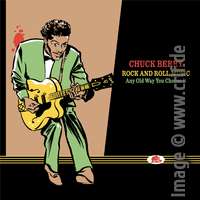
Chuck Berry: Rock And Roll Music had been planned to be released no later than Berry's 88th birthday on October 18th. However, problems with some suppliers caused a small delay.
Bear Family just told me that the boxes are shipping now. First copies to dealers went out on Monday, first copies to end users were shipped today. So expect your copy to arrive soon.
Those who ordered the more expensive Guitar Case Edition will have to be patient, though. Even though Bear Family ordered the guitar cases months ago, they are still waiting to get them. As of today, Bear Family expects the limited Guitar Case Edition to be shipped by the end of November.

Posted by Dietmar Rudolph
in Chuck Berry Recordings
at
11:56
| Comment (1)
| Add Comment
| Contact Webmaster
Sunday, October 26. 2014
Chuck Berry live from 1967 now on CD

In early 2008 I wrote a blog article on the various recordings of Chuck Berry concerts in San Francisco in 1967. Three of these shows had been only available for listening online at Wolfgang's Vault, now Concert Vault, a commercial site which runs on the archives of promoter Bill Graham and concert recordings from many other sources.
These recordings have now been made available as a 2-CD set called Check Me Out! (Crying Steel CSR02). It includes all three concerts available at the Concert Vault:
Anyway the 2-CD set is a nice professionally made item. And it even contains a recommendation for this site in its liner notes. Thanks!
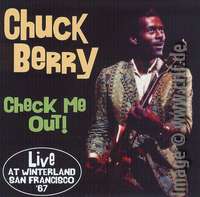
These recordings have now been made available as a 2-CD set called Check Me Out! (Crying Steel CSR02). It includes all three concerts available at the Concert Vault:
- March 18, 1967 - Winterland, San Francisco
This confused me a bit at first, because in 2008 Wolfgang's Vault had this concert dated March 19, which would place it to the Fillmore Auditorium and not to the Winterland where Berry and the Grateful Dead played on March 17 and 18. For some reason, the date of this recording has changed, though the recording itself didn't. - December 26, 1967 - Winterland, San Francisco
This concert was not available when I first wrote about these recordings. I added some comments in a 2009 blog post. - December 29, 1967 - Winterland, San Francisco
a quite interesting concert with some very looong versions.
Anyway the 2-CD set is a nice professionally made item. And it even contains a recommendation for this site in its liner notes. Thanks!

Posted by Dietmar Rudolph
in Chuck Berry Recordings
at
11:31
| Comments (0)
| Add Comment
| Contact Webmaster
« previous page
(Page 2 of 5, totaling 64 entries)
» next page
Main Page
This weblog is an addition to my Chuck Berry fansite called "A Collector's Guide to the Music of Chuck Berry" which describes all books and records of interest to everyone enjoying Chuck Berry's music.
Categories
What You Missed
Some earlier but important entries:
- Unanswered questions about the recording of Memphis, Tennessee
- Sweet Little Eight Variants of Sweet Little Sixteen
- The Johnny B. Goode Session
- Chuck Berry in Stereo
- Chuck Berry's Recording Session for Volkswagen
- Chuck Berry's Recording Session for Dr Pepper
- Tim McFarlin Introduces the Berry-Johnson Test into American Copyright Law
- Chuck Berry's Early Recording Locations
- Run! Rudolph, the Red-Nosed Reindeer â and the copyright mystery
- Chuck Berry live in New York 1956
- The very first Chuck Berry LP album
- The Chuck Berry On Stage (Chess LP-1480) confusion continues
- The Chuck Berry Vinyl Bootlegs, Vol. 1: Rare Berries
- Rocksmuk album - bootleg or not?
- 6034 cover versions of Chuck Berry songs
- Chuck Berry's Greatest Hits (Chess LP-1485) variants
Recent Entries
- CHUCK100 Tribute EP Series
- Thursday, January 16 2025
- CBID - Corrections, Additions, New Covers
- Friday, January 10 2025
- Rhythm and Rhyme - Chuck Berryâs poetic heartbeat
- Sunday, December 22 2024
- CBID - 6034 and counting ...
- Friday, November 1 2024
- CBID - 6034 cover versions of Chuck Berry songs
- Friday, July 5 2024
- CBID - The Never Ending Story - pt. 9
- Monday, June 10 2024
- CBID - The Never Ending Story - pt. 8
- Tuesday, June 4 2024
- CBID - The Never Ending Story - pt. 7
- Monday, April 22 2024
- Peter OâNeilâs So-Called Disorder
- Friday, April 12 2024
- The Chuck Berry Sound according to Atomicat
- Wednesday, April 10 2024
- CBID - The Never Ending Story - pt. 6
- Wednesday, April 3 2024
- CBID - The Never Ending Story - pt. 5
- Saturday, March 16 2024
- CBID - The Never Ending Story - pt. 4
- Monday, February 19 2024
- CBID - The Never Ending Story - pt. 3
- Monday, February 5 2024
- CBID - The Never Ending Story - pt. 2
- Monday, January 22 2024
- The Chuck Berry Vinyl Bootlegs, Vol. 3: America's Hottest Wax
- Tuesday, January 16 2024
- Chuck Berry in Fake Stereo
- Friday, January 12 2024
- CBID - The Never Ending Story
- Thursday, January 11 2024
- CBID - 5639 cover versions of Chuck Berry songs
- Tuesday, October 31 2023
- CBID - Covers, Chart Listings, and Not-Covers
- Monday, August 28 2023
- CBID - And they play Chuck Berry music - final part 10
- Monday, March 27 2023
- Little Queenie overdubs
- Monday, March 13 2023
- CBID - And they play Chuck Berry music - part 9
- Saturday, March 4 2023
- Lonely School Days - the variants explained
- Tuesday, January 31 2023
- An Interview with Johnnie Johnson - 1987
- Sunday, January 29 2023
Search
Copyright and Disclaimer
The complete contents of this weblog is
© Dietmar Rudolph
No part of this document may be used or published without written consent by the author.
Impressum/Haftungsausschluss/Datenschutz/Disclaimer
To contact the authors, email to cbguide@crlf.de.
© Dietmar Rudolph
No part of this document may be used or published without written consent by the author.
Impressum/Haftungsausschluss/Datenschutz/Disclaimer
To contact the authors, email to cbguide@crlf.de.
